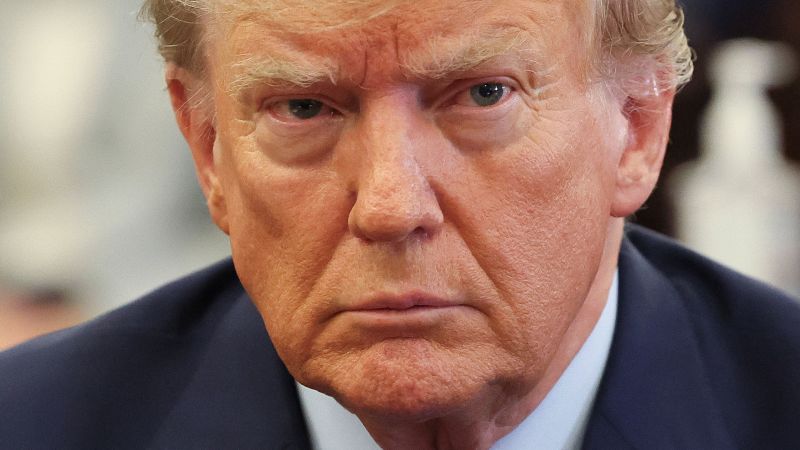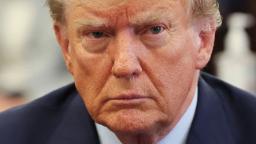
Analysis: Why Trump’s new trial cuts so deep — it’s about his fortune and brand

CNN
—
It’s where the “art of the deal” could be exposed as the “art of the steal.”
Donald Trump couldn’t stay away from the opening of his civil fraud trial in New York on Monday. But the choreographed motorcade of Secret Service SUVs, rants about politicized persecution and courtroom scowls went deeper than his now familiar attempts to turn his dates with justice into fodder for his 2024 campaign.
This time, the real estate shark was back in his old hunting grounds to defend his threatened empire, the Manhattan skyscraper bearing his name in big gold letters and ultimately the mythology of his career as a billionaire tycoon that nurtured his fame and insurgent rise to the White House. Being impeached twice is bad. Facing 91 criminal charges is terrible. But the fraud case in New York threatens to shred Trump’s cherished self-image as an ultimate winner. That may be worst of all for the ex-president who still touts his golf resorts, hotels, planes and businesses in campaign speeches as proof of what he sees as his stellar business acumen.
“It’s a scam, it’s a sham. Just so you know, my financial statements are phenomenal,” Trump said before the trial opened.
The paraphernalia of wealth is not simply about boosting Trump’s self-esteem. It is integral to his political appeal. While his history of bankruptcies, legal reversals and scandals has punctured his image among voters who disdain him, Republicans who love Trump still buy into his iconography as a hard charging businessman. That image was sent into overdrive by NBC’s “The Apprentice,” which helped turn the star of a reality show into a president and modern American demagogue. Taking kids on helicopter rides at the Iowa state fair or directing pilots of his personalized 757 to circle the field before airport rallies as speakers blare the theme to the movie “Air Force One” are all part of the theater that Trump concocts to portray himself as the ultimate self-made man who got rich despite elites spurning him for years.
This idea was encapsulated by one of his attorneys in court on Monday, who argued that far from inflating his wealth, her client may have played it down by not including the value of his image. “There would have been the brand, the same brand that got that man elected president,” Alina Habba said. “There’s a lot of people in this room that probably don’t like that, and that’s why we are here.”
So while this trial could punish Trump’s family by imposing huge financial and business penalties, and even lead to the break-up of his New York business and disposal of his buildings, it is about far more than punishments for the ex-president. It is taking aim at Trump’s core.
“They’re hitting him where it hurts,” one source told CNN’s Kaitlan Collins about Trump’s decision to attend the trial on Monday.
Letitia James – the New York attorney general who brought the case seeking at least $250 million in fines and seeks to prevent the Trump Organization from operating in the state – showed again Monday that she’s one of the rare Trump enemies who gets under his skin. “No matter how much money you think you may have, no one is above the law,” James said before court.
Where fantasy and reality collide
Extraordinary scenes in the Lower Manhattan courthouse also revealed another dimension of a legal storm surrounding Trump that is colliding with his campaign to regain the White House and is fomenting the most unprecedented presidential election in modern history.
Trump has pleaded not guilty in four criminal matters, including over alleged election meddling in a federal case and one in Georgia and over his hoarding of classified documents in Florida. And although he has denied all wrongdoing, Monday’s day in court showed how his confrontation with the law – in this and other cases – will be impervious to the boasting, falsehoods, vitriol, lies and alternative realities that the ex-president has repeatedly conjured to confound all kinds of political institutions that have tried to hold him to account.
Outside the courtroom, Trump raged about how he had shown up in person to watch the “witch hunt” and blasted James, a Democrat and a Black woman, as a “racist.” He dismissed Judge Arthur Engoron as “a disgrace” who should be disbarred for ruling last week in a summary judgment that the former president and his adult sons had committed repeated fraud ahead of the civil proceeding that will try six other claims, including conspiracy to falsify business records and insurance fraud. There’s no jury in this case to intimidate, but the ex-president’s rhetoric mirrors his verbal savaging of other prosecutors and judges in his multiple legal cases. It’s designed not just to influence the course of trials, but to destroy their legitimacy among voters and to mitigate the political damage of any future guilty verdicts.
The cliche of Trump’s life unfolding as a reality show is often overused. But the sense of a televised spectacle is still true. At times, as the ex-president and his son Eric walked past banks of cameras into court, it felt like an episode of a show like “Succession,” which was aired by HBO, a network owned by same parent company as CNN. The ex-president, who turned a criminal booking photo into campaign merchandise, by now has perfected the never-before-needed skill in presidential politics of shaping court appearances into campaign events. On Monday, he belted out an abbreviated version of a stump speech built around his supposed persecution as his campaign sent out simultaneous email fundraising blasts.
“They’re trying to damage me, so I don’t do so well as I’m doing in the election,” Trump said, characteristically accusing his enemies of indulging in the very crime of election interference with which he is charged in other cases, in a campaign conceit designed to inflame his base supporters and blot out the rest of the GOP primary campaign.
Trump’s bluster and political showmanship are proven to work, as his huge lead in the GOP presidential primary shows. But events behind the big wooden door of the courtroom, where a grim-faced former president spent the day, could not have created a greater contrast and spelled out a warning that he won’t be able to dismiss his election year criminal trials with the theatrics in which he is so skilled. Trump can boast about his wealth and real estate portfolio outside, but in Engoron’s courtroom, a Trump Tower triplex of 10,996 square feet is just that. It cannot magically transform into one of 33,000 square feet, as James’ suit claims it did under Trump’s assessments of his property and ultimately net worth. Engoron wrote in his summary judgment that this single act alone resulted in an overvaluation of between $114 to $207 million.
The judge coined a phrase specific to this case that also sums up Trump’s unique political method and how it may founder against the more stringent evidentiary standards of the law. Engoron wrote last week that arguments made by his lawyers came out of “a fantasy world, not the real world.”
Trump’s fantasies have not been confined to real estate. This is, after all, an ex-president who is documented to have lied thousands of times in office and who still insists – despite the testimony of his own former Justice Department, multiple court losses, and vote recounts and audits – that he was cheated out of office by a massive ballot fraud operation run by Democrats in 2020.
The standard of proof is far lower in a civil court than a criminal one, but the juxtaposition of Trump’s claims and the allegations against him in his criminal cases may come across as even more stark next year when several are expected to unfold in the heat of the presidential campaign. So far, the narrative he’s spun about his indictments has helped him politically, boosting his polling and fundraising (although much of that money, at least in the first half of the year, went toward paying his and his associates’ legal bills.) But the scenes in court on Monday, in which Trump sat meekly alongside his lawyers, were enough to suggest that the picture of a presidential nominee as a defendant may not be quite so attractive to general election voters as it is to his base.
In this civil case, his lawyer Chris Kise said in his opening statement that his team would refute the claims of inflating the value of his properties, noting that his client had “made a fortune literally about being right about real estate.” Habba, meanwhile, clashed with the judge who cited a valuation last week of Trump’s resort club at Mar-a-Lago, Florida, at $18 million, claiming it would go for at “least a billion” because of its ties to the former president.
The Trump campaign also distributed clips of James, who accused him in her lawsuit last year of perfecting the “art of the steal” in his real estate business. She ran for office vowing to take on Trump and they accused her of building a political career around prosecuting the former president.
In one campaign video, for instance, James warned that she would challenge Trump, whom she called an “illegitimate president,” and slammed his policies on the environment, toward foreign dictators and on transgender rights. The comments by James, who sat behind Trump in court Monday, literally and figuratively looking over his shoulder, have raised the question of whether the ex-president, because of his fame and political profile, has been unfairly targeted among business titans in New York.
But Trump’s legal fate in this and all the other cases will not be decided on campaign trails but in courtrooms. Then it will be up to voters to decide what they think of the verdicts.

